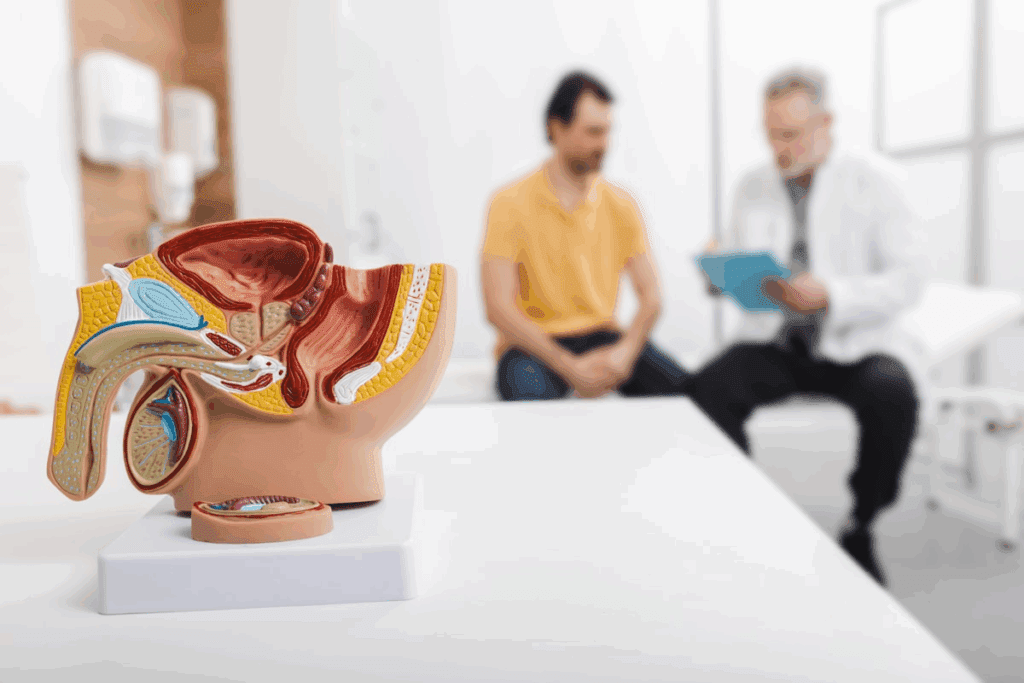Last Updated on November 25, 2025 by Ugurkan Demir

How do benign prostate enlargement psa levels help doctors differentiate BPH from prostate cancer? Get the facts on diagnosis.
Benign Prostatic Hyperplasia (BPH) is a common issue for men, often seen as they get older. It causes the prostate gland to grow, leading to urinary problems.
Knowing how BPH and PSA levels are connected is key for catching problems early. Regular health checks and screenings are important. They help find issues before they get worse.
Benign Prostatic Hyperplasia (BPH) is when the prostate gland gets bigger. This is not cancer. It can make it hard to pee and you might need to go more often.
Getting older raises your chances of getting BPH. Knowing what causes it and its symptoms helps manage it better.

Prostate-Specific Antigen (PSA) plays a key role in diagnosing Benign Prostatic Hyperplasia (BPH). It is a protein made by the prostate gland. High levels of PSA can mean BPH, but it’s important to know.
High PSA levels don’t always mean BPH. They can also show other prostate problems, like cancer. So, a detailed check is needed to find out why PSA levels are high.
Diagnosing Benign Prostatic Hyperplasia (BPH) is a detailed process. It starts with a thorough medical history and physical exam. A healthcare provider will first ask about your medical history to find any underlying conditions.
Then, a physical exam, including a digital rectal exam (DRE), will be done. This helps assess the prostate gland. Tests like PSA tests and urodynamic tests might also be needed. They help confirm the diagnosis and rule out other conditions.
By following this process, healthcare providers can create a treatment plan. This plan aims to manage BPH symptoms and improve your quality of life.
It’s important to tell BPH apart from prostate cancer. BPH is a non-cancerous growth of the prostate gland. It can cause symptoms like weak urine flow and frequent urination. Prostate cancer, a malignant tumor, needs immediate medical care.
To diagnose, doctors use physical exams, medical history, and tests like the Prostate-Specific Antigen (PSA) test. Knowing the difference helps in choosing the right treatment and avoiding complications.

Managing BPH requires a mix of lifestyle changes and medical treatments. Making smart choices about diet, exercise, and stress can help. This way, you can feel better and live a fuller life.
Lifestyle Changes
Living a healthy lifestyle is key in managing BPH. This means:
Medical Treatments
For some, medical help is needed to control BPH symptoms. This might include:
Combining lifestyle changes with medical treatments can greatly improve your life. It helps manage BPH symptoms effectively.
Managing BPH effectively involves making several lifestyle adjustments. By incorporating a balanced diet, regular exercise, and stress management techniques, individuals can alleviate symptoms and improve their quality of life.
A diet rich in fruits, vegetables, and whole grains can help manage BPH symptoms. Foods high in antioxidants, such as berries and leafy greens, are beneficial.
Regular physical activity, such as walking or swimming, can help reduce BPH symptoms. Exercise improves overall health and helps manage the condition.
Practicing stress-reducing techniques, such as meditation or deep breathing, can also help manage BPH symptoms. These techniques reduce overall stress levels, improving quality of life.
By implementing these lifestyle modifications, individuals with BPH can take a proactive approach to managing their condition and improving their overall well-being.
Benign Prostatic Hyperplasia (BPH) is a common issue in older men. It causes the prostate gland to grow bigger. Medications are key in managing BPH symptoms.
There are two main types of medications for BPH: alpha-blockers and 5-alpha-reductase inhibitors.
Alpha-blockers relax the muscles in the prostate and bladder neck. This makes it easier to urinate. They offer quick relief from BPH symptoms.
5-alpha-reductase inhibitors reduce dihydrotestosterone (DHT) levels. DHT is a hormone that makes the prostate grow. These medications help slow down prostate growth.
Surgical options can help men with Benign Prostatic Hyperplasia (BPH) find relief. It’s important to know the benefits and risks of each method. This knowledge helps in choosing the best treatment for each person’s needs.
When deciding on surgery, consider your symptoms, health, and what you prefer. This way, you can pick the surgical method that will improve your life the most.
Men with Benign Prostatic Hyperplasia (BPH) need ongoing care to manage symptoms and avoid complications. Regular check-ups help doctors track the condition’s progress and adjust treatment plans.
Good BPH monitoring is more than just checking PSA levels. It’s a full approach to prostate health. Regular digital rectal exams (DRE) and symptom checks are key. They help spot problems early.
“The key to managing BPH is not just treating the symptoms but also monitoring the condition to prevent long-term complications.”
— Expert in Urology
Untreated BPH can lead to serious problems like urinary retention and kidney damage. Regular monitoring helps avoid these risks. If symptoms get worse, doctors might change medication or suggest surgery.
Follow-up care for BPH is customized for each patient. Personalized care plans are based on health status, symptom severity, and prostate health. This ensures each patient gets the right care for their needs.
By focusing on BPH monitoring and follow-up care, we can greatly improve life for men with BPH. It’s a team effort between doctors and patients to manage BPH well.
Benign Prostatic Hyperplasia (BPH) can lead to serious problems if not treated. We will look at the risks of not treating BPH. This shows why getting medical help early is key.
One big problem is urinary retention. This happens when the prostate blocks urine flow. It makes it hard to empty the bladder. This can cause pain, discomfort, and even infections.
Another serious issue is kidney damage. If urine can’t flow, it backs up into the kidneys. This can harm the kidneys over time. It might lead to chronic kidney disease or make existing problems worse.
Other problems from untreated BPH include:
People with BPH symptoms should see a doctor to avoid these issues. Early treatment can greatly improve health and lower the risk of other problems.
We stress the need to manage BPH to prevent these complications. This ensures a better life for those affected.
It’s important to understand how Benign Prostatic Hyperplasia (BPH) and Prostate-Specific Antigen (PSA) levels are connected. This knowledge helps in diagnosing and managing prostate health accurately. We’ve looked into the details of BPH, how it’s diagnosed, and how PSA helps tell it apart from prostate cancer.
We’ve talked about different ways to manage BPH, like changing your lifestyle, using medications, or surgery. It’s key to keep an eye on your health and follow up regularly to avoid problems. Knowing about prostate health and what high PSA levels mean can help you make better choices for your care.
Keeping your prostate healthy is key to your overall well-being. We suggest talking to your doctor for advice on handling BPH and PSA concerns. Working with your healthcare team can help you find the right treatment for your needs.
BPH is a non-cancerous growth of the prostate gland. It can cause urinary symptoms.
Symptoms include trouble starting to urinate and weak urine flow. You might also urinate often or urgently. Waking up to urinate at night is another symptom.
Doctors use a medical history, physical exam, and tests to diagnose BPH. Tests include PSA testing, DRE, and urodynamic studies.
PSA is a protein from the prostate gland. High PSA levels can mean BPH, cancer, or other issues. But, a normal PSA doesn’t mean you’re clear of BPH.
Treatment varies based on symptoms. It might include lifestyle changes, medications, or surgery. Changes in diet and bladder training are common. Medications like alpha-blockers and 5-alpha-reductase inhibitors help. Surgery, like TURP, might be needed in severe cases.
Preventing BPH is hard, but a healthy lifestyle can help. Eating well and exercising regularly may reduce your risk.
Untreated BPH can cause urinary retention and damage to the kidneys and bladder.
BPH is a non-cancerous growth, while prostate cancer is a tumor. Both can cause urinary issues but need different treatments.
Options include lifestyle changes, medications, and surgery.
Not everyone with BPH needs surgery. Treatment depends on symptoms and other options. Your doctor will decide the best treatment for you.
National Center for Biotechnology Information. (2025). How Do Benign Prostate Enlargement and PSA Levels. Retrieved from https://pmc.ncbi.nlm.nih.gov/articles/PMC7335899/
Subscribe to our e-newsletter to stay informed about the latest innovations in the world of health and exclusive offers!